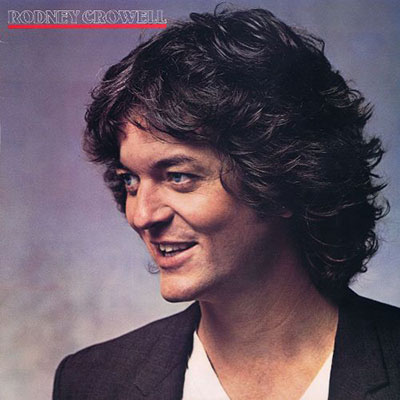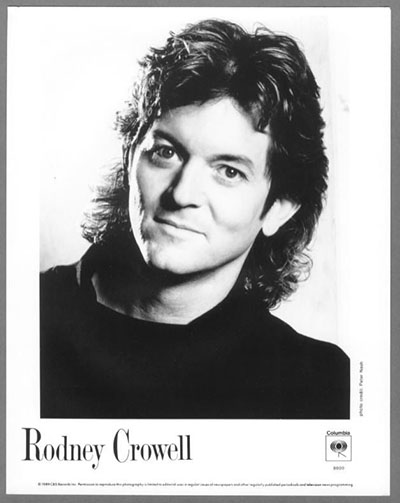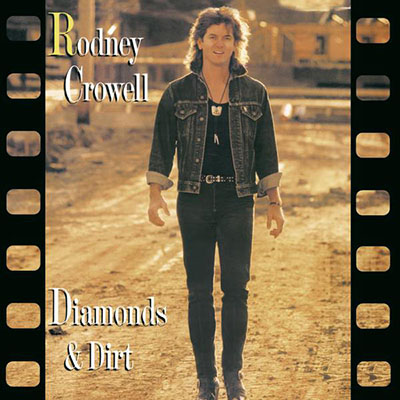|
RODNEY CROWELL: ALWAYS WORTH REDISCOVERING PCC's Vintage Interview with One of Our Finest Singer-Songwriters
This interview with Rodney Crowell took place in 1989, as his star was dramatically rising. His music had matured and was finally being fully appreciated. His marriage to Rosanne Cash seemed on good footing again. But there were many twists and turns, ups and downs ahead for the singer-songwriter. Crowell and Cash divorced in 1992. Since 1998, he has been married to Claudia Church. Meanwhile, he has continued to make great music. In 1990, Crowell won the Best Country Song Grammy for "After All This Time." "Old Yellow Moon," which teamed him with Emmylou Harris, captured the Best Americana Album Grammy in 2014. They earned another nomination in that category for 2016's "The Traveling Kind." In 2018, Crowell released the warm, intimate collection, "Acoustic Classics." In 2019, at age 68 , he continues to tour, playing his memorable songs, all filled with eloquently expressed, honest emotion. At its awards ceremony, the Academy of Country Music named Rodney Crowell 1989's top new male vocalist. Apparently Nashville missed its wake-up call. Crowell has been making acclaimed records for more than a decade. Though the singer-songwriter-guitarist had earned the admiration of his peers years earlier, it seemed that the public's reaction would always be, 'Rodney who? Oh, Rosanne Cash's husband, Johnny Cash's son-in-law.' Crowell's recognition factor skyrocketed with the release of his brilliant "Diamonds and Dirt" album. The LP, which ranges from raw rockabilly to western swing to poignant ballads to Beatle-ish pop, received three Grammy nominations. "She's Crazy for Leavin'," "It's Such a Small World," "I Couldn't Leave You If I Tried" and "After All This Time" all shot straight to the top of the charts. Crowell became the first artist to have four consecutive No. 1 singles on Billboard magazine's country music surveys, all from the same album, all written, produced and performed by the same person. His previous LP, "Street Language," was lavishly produced, rock-oriented and relatively ignored. Calling from his Nashville office, Crowell explains that he took a different approach with "Diamonds and Dirt." "Basically, I just decided that I had to relax. Before, I felt that everything had to be 'Sgt. Pepper's.' Well, everything isn't 'Sgt. Pepper's.' By the time I got around to making this record, I was of a mind that, 'Hey, this is only a record!' I realized I didn't have to move a mountain. That was liberating." Crowell doesn't lament the fact that commercial success took a detour before knocking on his door. He believes that, though his music might have been ready, he needed to mature as a performer and as a man. "All the obstacles I ran into gave me an opportunity to learn important lessons about life. I learned to reject the entire concept of failure. I learned to accept that I'm human. "I put out records that went nowhere. The songs got recorded by other performers and were big hits, which made me some money. I tried to put up a false front and say, 'That's okay. I'm an artist. I don't care about airplay or record sales.' Eventually, I learned to say, 'Shit! This is a bummer. I want my records to sell!' That's when things started turning around." In the past, Crowell straddled the line between rock and country, fitting neatly into neither category. Now he is comfortable at the far edge of country. "I like rock and roll, not rock. To me, there's a real difference. When I say rock and roll, I mean Chuck Berry, Big Joe Turner, early Everly Brothers and Elvis. It was energized, sexually alive, uncluttered.
"Rock music has become quite corporate. Rock radio is more concerned with profits than with rebels. In the 50s, rock and roll was the underdog. There's something about watching an underdog try to come from behind that's exciting. It fuels that fire. "Country music has always been an underdog. Now country radio is making room for artists who want to push the boundaries a little bit. There's a wave of musicians my age [38] who came of age in the 60s, when there was such a broad scope of things to pick up on musically. These days in country, performers' influences run the gamut. You can't just be a lounge lizard entertainer anymore. You've got to offer something different." Country music has long suffered from an image problem, according to Crowell. "The country industry seems to have accepted that we're always depicted as unintelligent cornballers. The media, through shows like 'Hee Haw,' has perpetuated that hayseed mentality. Listen to Hank Williams Sr. or Lefty Frizzell and you'll hear a subtle intelligence behind the poetry of their music. If you don't bother to look a little deeper than the clichés, you'll never discover the richness of country." As a seven-year-old in Houston, Crowell memorized every one of his parents' Hank Williams Sr. 78s. By time he reached 13, he played drums in his father's band. His father, who died recently, worked at construction sites on weekdays and played the honky-tonks on the weekends. "My dad was totally in love with music," Crowell says. "I guess that's where I caught the obsession." When he turned 22, Crowell, whose idols ranged from Merle Haggard and Jimmie Rodgers to Bob Dylan and John Lennon, journeyed to Nashville. "I was writing mind-garden bullshit," he says with a laugh. "It was all very naive. Then I met Townes Van Zandt, Guy Clark, Mickey Newbury and Harlan Howard -- hardcore, steel-trap, serious songwriters who just chewed up my stuff and spit it out. "To my credit, I recognized immediately the inferiority of my songs, when compared to theirs. So I went off and hid and read and did a lot of wood-shedding until I could go to a songwriters' gathering and play something and have it stand up." Crowell began to garner attention when he joined Emmylou Harris' Hot Band. He was described as "the new Gram Parsons." When he recorded his own songs, renowned artists rushed to record cover versions. Bob Seger had a hit with "Shame on the Moon," Waylon Jennings with "Ain't Livin' Long Like This" and the Dirt Band with "An American Dream." Crowell also won praise for producing albums by such high-profile talents as Robert Duvall, Sissy Spacek, Johnny Cash and Rosanne Cash. 1987's "King's Record Shop," produced by Crowell, made Rosanne Cash one of country's fastest rising stars. But Crowell would not record a duet with his spouse until 1988's "It's Such a Small World" (From his "Diamonds and Dirt" album), because he feared that he could be accused of using her celebrity. "When she was having a great deal more acceptance than I was, it was real hard for me to handle," Crowell admits. "I wasn't the kind of guy who was going to sit back and allow somebody to have more fun than me without bitching about it. Finally, I learned to accept it and to concentrate on my own work. "For the most part, the competition between us has been pretty positive, the kind where she would write a good song and it would make me mad that hers was better than mine, so I would set about to try to top it."
In some instances, their most revealing communication came through their music. "Sometimes, subconscious realities come through the songs," Crowell says. "When Rosanne made that 'Rhythm and Romance' record [1985], I was standing there with my jaw dropped open. Her songs painted me to be a real asshole. And rightfully so, because I was. As long it's the truth and it rhymes, go ahead. It set me straight." Crowell and Cash, who are raising four daughters, have weathered stormy periods, marked by separations and drug and alcohol problems. They're back on solid footing. "With the two of us, it's a case of the blind leading the blind. We just go through this stuff and react as it comes. We've been incredibly successful at negotiating our way through an emotional mine field. We've had a really hard time. She's really stubborn and so am I. But we've managed to survive and now our marriage is healthier than ever." They act as mutual sounding boards. "She's the best judge of my work and vice versa," Crowell says. "We know when the other is not being real in our music. An outsider couldn't tell. It's a luxury to have that kind of input." Crowell believes that his writing has never been better. "I've become more prolific. Sometimes the songs just jump out from a deep-down, hard-to-get place and land on the page in front of me. I do some of my finest work when my brain doesn't get a chance to get in the way." Will success spoil Rodney Crowell? "Four No. 1 songs don't make you an artist. That's what I keep telling myself. The numbers are just byproducts. If you get it all turned around to where your focus is on the charts, you're riding for a fall. "I feel like I've just scratched the surface. I'm still learning what I can do. I'm certain that my best melodies and lyrics and performances are still a ways up the road."
Be sure to also read our more recent interview with Rodney Crowell: For the latest on this artist, visit www.rodneycrowell.com. |
|


